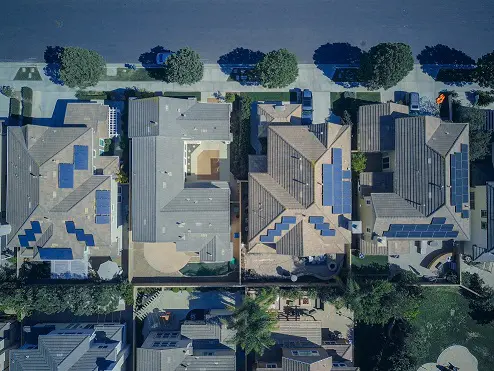
Solar Solutions for Summer Storms
August 22, 2022
We recently lost power at my house during a summer evening thunderstorm. As a native Atlantan accustomed to living in a city of trees, it was an experience I have endured many times. For my two young children however, the event was less familiar, especially as the power remained off through the night and the summer morning sunshine began to raise the indoor temperature. Our neighborhood group text was filled with messages of lament from other parents of young kids when Georgia Power estimated a 3:00pm restoration time.
In moments like these, homeowners without a generator tend to reflect on backup or alternative power sources. Not long after our power outage, the Inflation Reduction Act was signed into law, making a range of clean energy alternatives to traditional generators more affordable via enhanced tax credits that will become effective in 2023.
Qualifying purchases include solar panels and battery storage, allowing homeowners who install such systems to claim a non-refundable federal tax credit equal to 30% of the cost of eligible expenses, with no cap. Since home solar involves high upfront costs and the uncertainty of recouping those costs if the home is sold, the credit may help tip some homeowners’ thinking in favor of solar.
Tools like Google’s Project Sunroof can help homeowners assess whether adding a solar array to their rooftop might be financially advantageous based on their home’s sun exposure, energy use, and other factors. Here in Georgia, for those with a reasonably energy efficient home and a low to average electric bill, solar may not always be the best solution. One factor that may dissuade some from installing solar power at home is Georgia Power’s cap on “net metering,” which limits the ability to sell unused energy back to the grid at retail rates to just 0.2% of its customers.
The rising popularity of electric vehicles (EVs), which increase residential power consumption, may increase demand for rooftop solar. “Filling up” an EV from electricity produced by rooftop solar helps accelerate the breakeven point of a solar installation, especially when the system includes battery storage. The Inflation Reduction Act also provides EV tax credits, which, for the first time, includes some purchases of used EVs. There are catches: to qualify for the credit, the EV must have been assembled in North America, and starting in January 2023, the credits will be limited to those with income below $150,000 individually or $300,000 for joint filers. In addition, credits will only be available for lower priced EVs. For cars, that means an MSRP below $55,000, and for trucks, SVs, or vans, the number is $80,000. Anyone with higher income, and those planning to buy more expensive EVs, may want to consider making a purchase in 2022.
Thankfully power at our house was restored well before the 3:00pm estimate. The inevitable Atlanta thunderstorms, combined with the new incentives, might well lead to the addition of solar power production to my neighbors’ roofs in the coming years.
Cam Simonds

